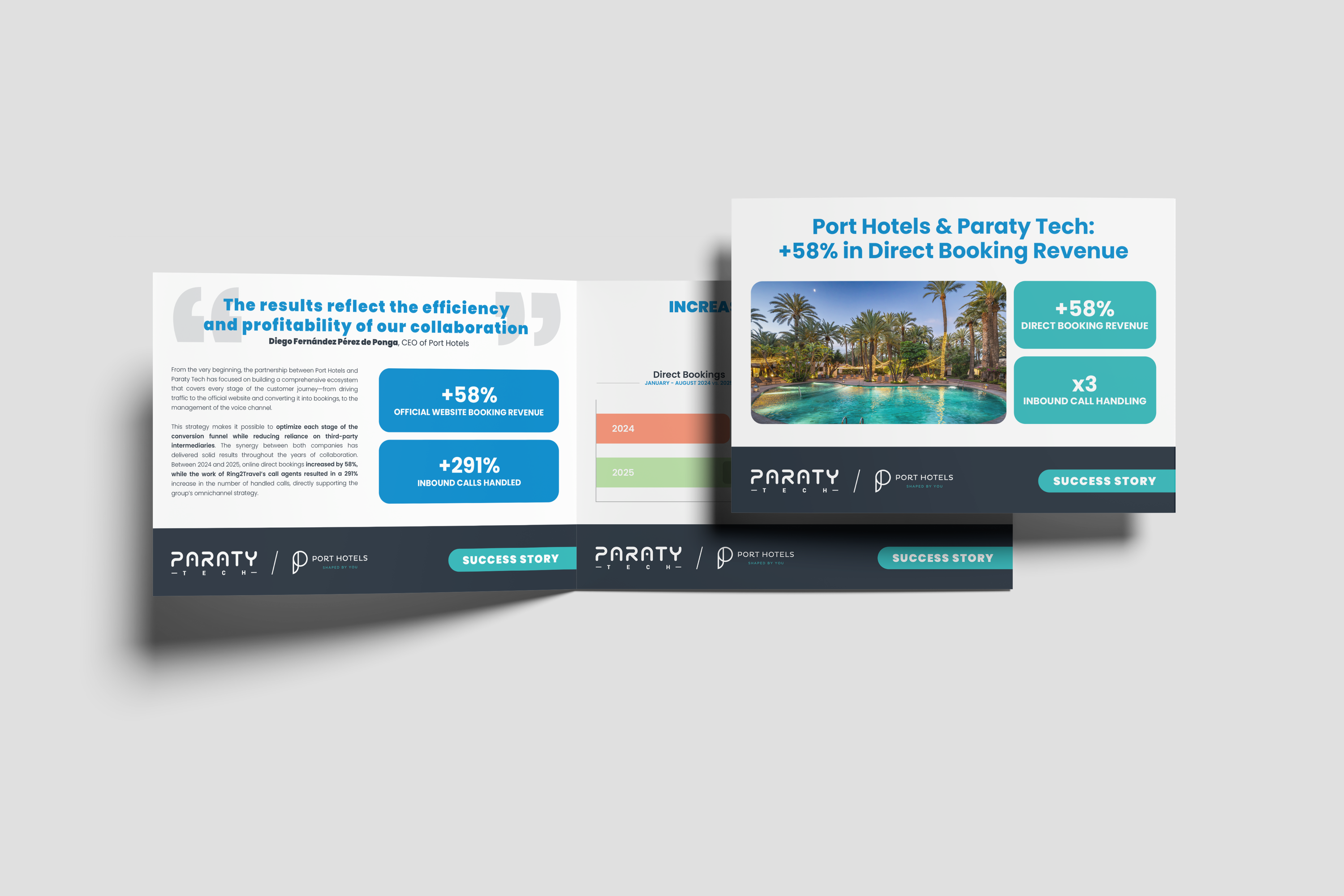INFOGRAPHIC Your newsletters and databases, more powerful than ever
Marketing 10/01/2019
Discover why, after the entire process of adapting to the GDPR, your databases are now more useful and your commercial shipments more effective. It was the month of May 2018 and those furthest behind were beginning to hear the sound of trumpets that, in reality, had been sounding for a long time, specifically since May 25, 2016, indicating a change of third. The General Data Protection Regulation (GDPR) hit hard at the unsuspecting, and even those who had done their homework, hesitantly weathered the rigor of some requirements that, after overtaking the Organic Law on Personal Data Protection, Personnel (LOPD), entered the scene without hesitation. Faced with this scenario, a good part of the hotel sector crew watched uncertainly from the sidelines with only one thought in their heads: the bull is going to catch us, if it hasn't already. What a job!
Privacy policy, cookie policy, legal notice, general contract conditions, express consent, double layer, double checkbox... Without the objective of explaining again the details and nooks and crannies of the magnitude of the change that the RGPD represented for hotels , it is worth remembering that at that time the alarm bells went off in many ways. Today we want to focus the focus of these lines on how the entire process affected customer databases and their use for purely commercial purposes: newsletters, emailings, promotional shipments, etc. The truth is that very specific questions arose within hotel establishments for which there were unclear answers. Among those who were not certain that they had collected all those contacts in accordance with the requirements stipulated in the defunct LOPD, a real fear of losing or seeing such a precious asset reduced to its minimum expression spread:
At Paraty Tech we live this adventure firsthand. Among many other services, we design the Official Website of hotel establishments, we provide them with a reservation engine, we define their online marketing strategy, we prepare and manage their commercial shipments, etc. All of these tasks also entail a certain processing of the personal data of their clients, which meant that our role during the aforementioned transition was twofold:
Customer databases play a fundamental role in the commercial and loyalty strategy. They encourage direct communication with clients of the past, who also constitute a group of potential visitors from the future. They also provide decisive information for the work of the revenue manager, to the extent that they help define and segment the different targets that, in the final stay, will fill their rooms and occupy their beds.
Their value is undeniable and expanding them is almost an obsession for hotel establishments. The problem then was that, until the arrival of the GDPR, any method seemed valid to achieve that goal: reservation forms, contact forms, subscription forms, satisfaction forms, access to platforms, in-person check-ins, etc. Consequently, the origin of many of these databases was dubious. The hotel establishments themselves did not know to what extent they had actually been complying with current regulations, which meant having to once again request the express consent of all their contacts in order to continue communicating with them. A nightmare…
As if this were not enough, mass sending platforms, such as Mailer Lite or Mailchimp, did not seem to help much either. As the last link in the chain of data controllers, we must not forget that the success of their service depends largely on the quality and reliability of the databases they manage, the legal origin of the contacts that make them up, and their harsh restrictive policies in this regard.
Hand in hand with a strict “purge” protocol, they were forced to delete all contacts without signs of activity during the last six months, and to provide supporting documents that represented reliable proof of their express consent to belong to the distribution lists. An apparently desolate panorama.
And thus we arrive at the famous wave of requests. The inboxes of millions of users were filled with endless emails informing them of changes to the privacy policies and politely asking them to accept them again. Hotels and tourist apartments did a true exercise of generosity, they used their kindest language, they gave free rein to all their creativity, in an almost desperate attempt to maintain that bond, to ensure they stayed in touch. Even so, as expected, they helplessly witnessed a worrying reduction in records in their databases. Hunger and the desire to eat had come together:
However, contrary to all predictions, almost eight months later, it seems that all is not lost. We have analyzed the data carefully and from Paraty Tech we send a message of optimism and peace of mind: your emailing campaigns can now be even more efficient and profitable than then .
A reasonable amount of time has passed and the truth is that all the circumstances described above have had consequences, yes, but positive ones. On May 25, 2018, many saw their databases go from thousands of contacts to hundreds or even dozens. However, there are currently obvious signs of recovery, subscribers are gradually increasing and, most importantly, to the detriment of the quantity of contacts, their quality has multiplied exponentially.

Today they fill out the rows and columns of the hotel databases because they really want to be there, because they are interested in being told things, presenting news and offering incentives. His predisposition is maximum. They are much more receptive and active than ever.
This new position of users is perfectly verifiable and measurable through such important indicators as opening/click rates or bounce/unsubscribe rates. The former are clearly increasing, the latter are in free fall. Although we should not abuse it, knowing that we are not annoying should encourage us to continue making the most of this channel, whose return in the form of direct reservations through the Official Website seems increasingly juicy.
There is life, and a lot of it, after the GDPR!
Privacy policy, cookie policy, legal notice, general contract conditions, express consent, double layer, double checkbox... Without the objective of explaining again the details and nooks and crannies of the magnitude of the change that the RGPD represented for hotels , it is worth remembering that at that time the alarm bells went off in many ways. Today we want to focus the focus of these lines on how the entire process affected customer databases and their use for purely commercial purposes: newsletters, emailings, promotional shipments, etc. The truth is that very specific questions arose within hotel establishments for which there were unclear answers. Among those who were not certain that they had collected all those contacts in accordance with the requirements stipulated in the defunct LOPD, a real fear of losing or seeing such a precious asset reduced to its minimum expression spread:
- What will become of my current databases?
- Will I be able to continue using them for my next shipments?
- How will I get them to continue growing?
At Paraty Tech we live this adventure firsthand. Among many other services, we design the Official Website of hotel establishments, we provide them with a reservation engine, we define their online marketing strategy, we prepare and manage their commercial shipments, etc. All of these tasks also entail a certain processing of the personal data of their clients, which meant that our role during the aforementioned transition was twofold:
- On the one hand, we had to ensure that we were the first to comply 100% with the demands that corresponded to us as those responsible for said data, partly provided by the hotel establishments themselves, partly collected through their Official Website.
- On the other hand, from an ethical point of view, we had to act as advisors, anticipate and advise to ensure that our clients also caught up with the least possible negative impact, and that their main direct sales channel reflected this.
Customer databases play a fundamental role in the commercial and loyalty strategy. They encourage direct communication with clients of the past, who also constitute a group of potential visitors from the future. They also provide decisive information for the work of the revenue manager, to the extent that they help define and segment the different targets that, in the final stay, will fill their rooms and occupy their beds.
Their value is undeniable and expanding them is almost an obsession for hotel establishments. The problem then was that, until the arrival of the GDPR, any method seemed valid to achieve that goal: reservation forms, contact forms, subscription forms, satisfaction forms, access to platforms, in-person check-ins, etc. Consequently, the origin of many of these databases was dubious. The hotel establishments themselves did not know to what extent they had actually been complying with current regulations, which meant having to once again request the express consent of all their contacts in order to continue communicating with them. A nightmare…
As if this were not enough, mass sending platforms, such as Mailer Lite or Mailchimp, did not seem to help much either. As the last link in the chain of data controllers, we must not forget that the success of their service depends largely on the quality and reliability of the databases they manage, the legal origin of the contacts that make them up, and their harsh restrictive policies in this regard.
Hand in hand with a strict “purge” protocol, they were forced to delete all contacts without signs of activity during the last six months, and to provide supporting documents that represented reliable proof of their express consent to belong to the distribution lists. An apparently desolate panorama.
And thus we arrive at the famous wave of requests. The inboxes of millions of users were filled with endless emails informing them of changes to the privacy policies and politely asking them to accept them again. Hotels and tourist apartments did a true exercise of generosity, they used their kindest language, they gave free rein to all their creativity, in an almost desperate attempt to maintain that bond, to ensure they stayed in touch. Even so, as expected, they helplessly witnessed a worrying reduction in records in their databases. Hunger and the desire to eat had come together:
- Uncertain origin of databases
- Need to request new express consent
- Greater difficulty in obtaining new subscriptions
- Tightening the protocols of mass shipping platforms
However, contrary to all predictions, almost eight months later, it seems that all is not lost. We have analyzed the data carefully and from Paraty Tech we send a message of optimism and peace of mind: your emailing campaigns can now be even more efficient and profitable than then .
A reasonable amount of time has passed and the truth is that all the circumstances described above have had consequences, yes, but positive ones. On May 25, 2018, many saw their databases go from thousands of contacts to hundreds or even dozens. However, there are currently obvious signs of recovery, subscribers are gradually increasing and, most importantly, to the detriment of the quantity of contacts, their quality has multiplied exponentially.

Today they fill out the rows and columns of the hotel databases because they really want to be there, because they are interested in being told things, presenting news and offering incentives. His predisposition is maximum. They are much more receptive and active than ever.
This new position of users is perfectly verifiable and measurable through such important indicators as opening/click rates or bounce/unsubscribe rates. The former are clearly increasing, the latter are in free fall. Although we should not abuse it, knowing that we are not annoying should encourage us to continue making the most of this channel, whose return in the form of direct reservations through the Official Website seems increasingly juicy.
There is life, and a lot of it, after the GDPR!

















